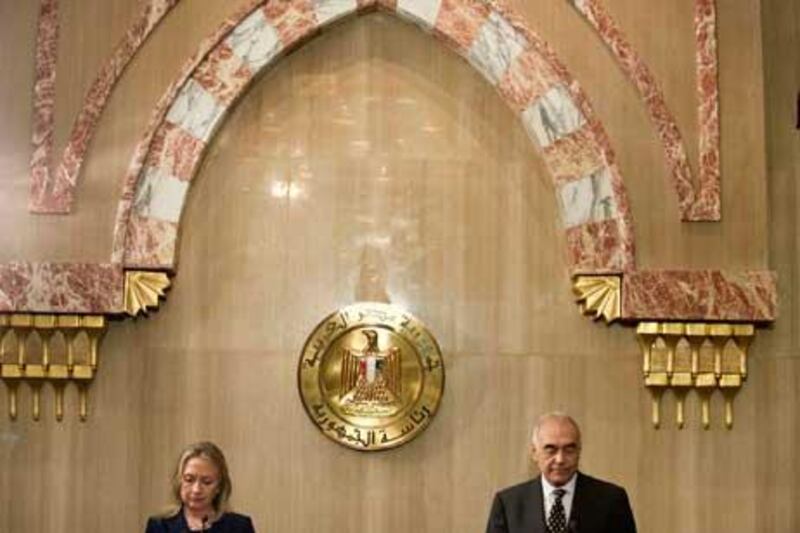CAIRO // Hillary Clinton offered “strong support” for a profoundly changed Egypt yesterday and said the United States was looking forward to the military’s departure from politics.
The military ruling council’s role is “first and foremost a question for the Egyptian people, but the United States supports the full transition to civilian rule”, the US secretary of state said. The army should “return to a purely national security role”.
In a sign of the changing political landscape, Mrs Clinton held talks with Egypt’s president Mohammed Morsi, a former member of the Muslim Brotherhood, the Islamist group that the US has long viewed with suspicion.
The official agenda was expected to include aid packages, the importance of women and Coptic Christians and Egypt’s treaty with Israel – but the meetings themselves are filled with symbolism.
Mr Morsi received Mrs Clinton in the same palace that his deposed predecessor Hosni Mubarak used to meet visiting officials.
The meeting with Mr Morsi appeared to be slightly awkward, perhaps a sign of Mr Morsi's strong views about relations between men and women. The two did not publicly shake hands and sat some distance apart, with Mrs Clinton on a sofa and Mr Morsi on a chair.
“Things change at kind of a warp speed,” Mrs Clinton said.
After the meeting, Mrs Clinton addressed the media at a joint conference with the foreign minister, Mohammed Amr. “I have come to Cairo to reaffirm the strong support of the United States for the Egyptian people and their democratic transition,” she said.
“We want to be a good partner and we want to support the democracy that has been achieved by the courage and sacrifice of the Egyptian people,” Mrs Clinton added.
Under Mubarak’s nearly 30-year reign as president, he forged a close relationship with the US. Egypt became a linchpin of US foreign policy in the Middle East, playing a key role in attempts to establish peace between Israel and the Palestinians and later assisting with the “war on terror” after the September 11 attacks.
Official transcripts of telephone conversations between Mubarak and successive US presidents reveal the casual, jocular tone of those relations. "Hosni, how's the world's greatest diplomat?" began a call from George H W Bush in August 1990.
Throughout Mubarak's rule, the US kept its distance from the Muslim Brotherhood, which was officially banned in Egypt by Mubarak's regime and subjected to brutal repression by his security services.
That began to change only after the January 25, 2011, uprising that forced Mubarak to resign 18 days later. Within months, Mrs Clinton confirmed that US officials had met Muslim Brotherhood leaders about the country's democratic transition.
The relationship between the two countries has been tested in the past seven months after an Egyptian court began hearing a case against NGOs alleged to be operating illegally without a licence. The NGOs include several prominent civic groups affiliated with US political parties.
But, analysts say, Egypt's foreign relations, including with the US, have remained largely intact since the uprising.
Mr Morsi's choice of Saudi Arabia for his first visit as president last week was seen as a sign that Egypt would continue – for now – with the status quo, said Namira Negm, a legal adviser to the Egyptian foreign ministry who is on leave to teach international relations at the American University in Cairo.
“Visiting Saudi Arabia proves that President Morsi values the relationship with Egypt’s long-time allies,” she said. “We cannot view that visit as just a visit to an important Arab country. It also encompasses the relationship with the US, which is Saudi Arabia’s strategic ally, and Israel.”
The Muslim Brotherhood and its political arm, the Freedom and Justice Party, have made it clear that they view the US as a strategic partner and have no intention of overturning any of the country’s treaties.
The US has portrayed its support for the Egyptian democratic transition as unbiased in favour of any group or political movement.
Its close ties with the military, however, position it as a delicate arbiter in the growing dispute between the generals who make up the Supreme Council of the Armed Forces (Scaf) and Mr Morsi. Mr Clinton is to meet Field Marshal Hussein Tantawi, head of Scaf.
The two sides in Egypt are locked in a legal battle over powers and the writing of a new constitution. Mrs Clinton has urged “intensive dialogue” between the two sides to prevent the transition from veering off track.
Mrs Clinton said during the press conference yesterday: “Democracy is hard. It requires dialogue and compromise and real politics. We are encouraged and we want to be helpful. But we know it is not for the United States, it is for the Egyptian people to decide.”
Egypt has modernised its army with billions in US military aid over the past 30 years.
The US Agency for International Development has also provided more than US$28 billion (Dh102.76bn) worth of economic and development assistance to Egypt since 1975.
Some observers saw Mrs Clinton’s visit to Egypt as a tentative step towards new aid packages to support the economy, which has suffered amid the uncertainty of the political transition.
“I think it is more than a ceremonial visit, but it is only the beginning of a process where America shows it is ready to help the transition particularly with respect to economic assistance and soft loans,” said Nabil Fahmy, Egypt’s former ambassador to Egypt.
He did not, however, expect the US to use its power to influence Egypt’s trajectory.
"Egypt is going through an important, complex and delicate transition," he said. "The transition has proven to be more difficult than any of us expected, but all of that being said I think this is an Egyptian issue."
bhope@thenational.ae
* With additional reporting by Agence-France Presse, Associated Press and Bloomberg News





